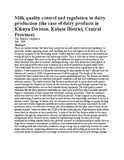| dc.description.abstract | There are limited studies that have been carried out on milk quality control and regulation. In particular, studies regarding proper milk handling practices and hygiene at the farm are few in Kenya as compared to the developing world. Studies that have been carried out concentrated on testing of milk at the production and marketing outlets. There is little that is known on practices and level of hygiene that occur on the farm that influence the quality of milk produced.
The study therefore attempted to examine challenges facing clean milk production and hygiene at farm level and benefits that accrue to farmers as a result of production of good quality milk. They established the level to which dairy producers are aware about regulations in the dairy industry. It was conducted in Kikuyu division among 85 dairy producers and 5 officials from the Ministry of Livestock, KDB, Cooperatives and a Self Help group.
The results of the study showed that dairy production in the area is an income generating activity. The farmers are mainly smallholder dairy producers endowed with good crossbred cows and well established formal and informal markets. The study revealed that the dairy producers get to know about milk quality control through the Ministry of Livestock, the veterinary doctors and through seminars that are organized by stakeholders such as feed manufacturing companies The milk quality control measures that the dairy producers undertake are clean milk production which includes personal hygiene, cleanliness of milk equipments and proper milking procedures.
These are measures which are relatively easy to understand and cheap to practice. Proper hygiene in zero grazing units and testing of mastitis was not done because farmers lack knowledge and funds to invest in disease control. Shortage of labour, lack of veterinary services and knowledge on proper feeding and insecurity further depresses profitability in dairy production. Farmers concentrate on milk production where very few have ventured into value addition and therefore most of them do not possess licenses. Some are aware that KDB is the law enforcing arm of government while others know them as educators in dairy production.
In spite of the fact that farmers abide by the dairy regulation through the cooperatives, they are not informed about them Farmer groups should be strengthened where farmers can be exposed to regulation governing the dairy sector and sensitized on existing options which may provoke interests in entrepreneurship or enable them to forge better business relationships. In addition, timely dissemination of pro poor interventions like availing small size aluminium containers can go a long way in improving incomes for small holder dairy farmer. Improving infrastructure such as roads and beefing up security like at the collection points is mandatory to encourage investment and avoid loss of milk through spillage. | en_US |

